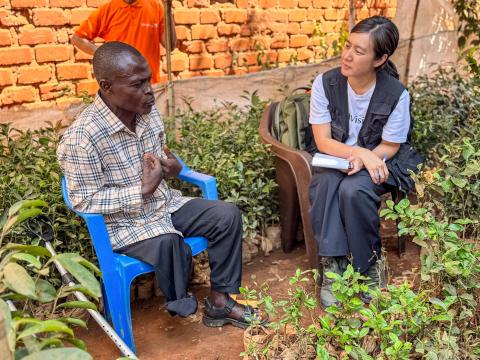DR Congo: From Perseverance to Prosperity - The Journey of Ilunga Mpundu Balthazar

In La Vallée, in the Haut-Katanga Province of Lubumbashi, the social fabric is woven with ingenuity and mutual aid. Households live on irregular incomes within an informal economy where subsistence farming, nurseries, and small livestock coexist with casual jobs. Churches provide moral structure, while neighbours share tools and advice.
This is where Ilunga Mpundu Balthazar, a man with a disability, chose to support his family through the land. His journey began with an improvised nursery at the edge of his plot.
“In the past, I produced 200 or 300 seedlings, but had no buyers. They grew old and were lost. Yet I kept the courage to continue,” he recalls.
That perseverance, though tested by lack of outlets, paved the way for a decisive encounter and transformation. Since 2024, after taking part in the Empowered World View training, Balthazar has progressively scaled up his activities. Initially hesitant,“I didn’t yet have many trees”, he nonetheless reached out to technical services and potential buyers.
Over the 2024–2025 period, he refined his practices: nursery density, shading, watering, transplanting schedules, and loss tracking. Before engaging with World Vision, his nurseries suffered up to 80% losses. Within a few seasons, production grew from a few hundred seedlings to over a thousand per cycle. Today, he manages 15,000 seedlings with 6,000 more in preparation, 20 hectares under cultivation, and 30 additional hectares mapped for expansion. The plots are now orderly, nurseries well maintained, and a modest but steady income covers inputs and school fees.
With guidance from Mr. Micky (Livelihood Specialist, Lubumbashi cluster) and Mr. Augustin (Child Well-being Facilitator, Luwowoshi AP), Balthazar developed a three-year plan to ensure sustainability:
Stabilize nursery quality through smaller but consistent batches and sales tracking.
Secure outlets via local agreements with schools and parishes.
Strengthen cash flow through regular savings for inputs and school expenses.
Mindful of his disability, he has adapted his site: raised tables, wider paths, and gravity-fed watering systems that reduce physical strain and improve efficiency. He now integrates resilient species, grafted mango, citrus, acacia, moringa, and applies water-saving techniques such as mulching, micro-basins, and shade nets. A small compost unit is being developed to reduce fertilizer costs. His aim is not volume for its own sake, but consistency: regular monthly sales, repeat customers, and stable income.
At the community level, Balthazar has become a local resource person. With the neighborhood committee and his church, he organizes short hands-on sessions on pre-germination, shading, and transplanting for women and youth. He also advocates for a savings group among nursery keepers to purchase tools and seeds collectively. His motto is simple: “Faith is proven by organization.”
Where he once worked alone, he now collaborates, with schools for living hedges, parishes for reforestation, and households for community plantings. His story is no longer one of a struggling nursery but of a growing ecosystem that learns to sow, count, sell, and reinvest.
Spiritually, Balthazar believes that genuine faith is demonstrated through action. The Empowered World View training did not create his determination; it refined and directed it. Within two seasons, results are visible: larger, better-kept nurseries, diversified agroforestry, and structured agropastoralism. For him, solidarity means organized cooperation, sharing knowledge, labour, and resources, to build sustainable livelihoods.
Technically, he now standardizes soil preparation, regulates nursery density, and staggers sowing to ensure year-round sales. He keeps simple records on mortality, inputs, and revenue, helping him plan effectively. The transformation is visible on the ground: tidy paths, shade nets, adapted tables, and a cash reserve for school fees. Discipline has become his main resilience factor.
Balthazar’s vision is coherent: to consolidate production, reinforce agroforestry for food security, and institutionalize knowledge sharing through training clinics for young nursery keepers and church-based collaborations that link theology and practice. His children benefit directly, his income keeps them in school, some pursuing technical studies.
“The income allows me to keep all my children in school; some have graduated in metallurgy, geology, or mechanics,” he proudly says.
His appeal to partners is grounded in experience:
“If today my children have returned to school, it is thanks to World Vision… We need you.”
Through perseverance, organisation, and faith, Ilunga Mpundu Balthazar embodies the essence of Empowered World View: inner transformation leading to economic and social renewal. From an isolated producer once discouraged by loss has emerged a resilient agro-entrepreneur, one who plans, produces, and inspires his community to cultivate hope.